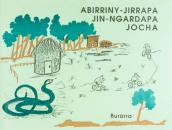In Burarra language, with English translation at the back of the book.
From a story by Katie Fry in the Burarra (Gu-jarlibiya/Gu-jingarliya) language group of Central Arnhem Land.
 8518810214476566451.jpeg
8518810214476566451.jpeg
 Living Archive of Aboriginal Languages
Charles Darwin University
,
Northern Territory
:
Charles Darwin University
,
2014
7544524
2014
website
series - publisher
Indigenous story
Living Archive of Aboriginal Languages
Charles Darwin University
,
Northern Territory
:
Charles Darwin University
,
2014
7544524
2014
website
series - publisher
Indigenous story
'The Living Archive of Aboriginal Language is a digital archive of endangered literature in Australian Indigenous languages from around the Northern Territory.' This archive connects to the people and communities where the literature was created, allowing for collaborative research work with Indigenous authorities and communities.
Clicking on the website's map to enter the archive, opens hundreds of items in 25 languages from all over the Northern Territory. The Website gives comprehensive instructions on the use of the site for Linguists, Communities, teachers, and students and/or researchers. (Source: LAAL Website)
Northern Territory : Charles Darwin University , 2014From a story by Katie Fry in the Burarra (Gu-jarlibiya/Gu-jingarliya) language group of Central Arnhem Land.
 Living Archive of Aboriginal Languages
Charles Darwin University
,
Northern Territory
:
Charles Darwin University
,
2014
7544524
2014
website
series - publisher
Indigenous story
Living Archive of Aboriginal Languages
Charles Darwin University
,
Northern Territory
:
Charles Darwin University
,
2014
7544524
2014
website
series - publisher
Indigenous story
'The Living Archive of Aboriginal Language is a digital archive of endangered literature in Australian Indigenous languages from around the Northern Territory.' This archive connects to the people and communities where the literature was created, allowing for collaborative research work with Indigenous authorities and communities.
Clicking on the website's map to enter the archive, opens hundreds of items in 25 languages from all over the Northern Territory. The Website gives comprehensive instructions on the use of the site for Linguists, Communities, teachers, and students and/or researchers. (Source: LAAL Website)
Northern Territory : Charles Darwin University , 2014From a story by Katie Fry in the Burarra (Gu-jarlibiya/Gu-jingarliya) language group of Central Arnhem Land.
 Living Archive of Aboriginal Languages
Charles Darwin University
,
Northern Territory
:
Charles Darwin University
,
2014
7544524
2014
website
series - publisher
Indigenous story
Living Archive of Aboriginal Languages
Charles Darwin University
,
Northern Territory
:
Charles Darwin University
,
2014
7544524
2014
website
series - publisher
Indigenous story
'The Living Archive of Aboriginal Language is a digital archive of endangered literature in Australian Indigenous languages from around the Northern Territory.' This archive connects to the people and communities where the literature was created, allowing for collaborative research work with Indigenous authorities and communities.
Clicking on the website's map to enter the archive, opens hundreds of items in 25 languages from all over the Northern Territory. The Website gives comprehensive instructions on the use of the site for Linguists, Communities, teachers, and students and/or researchers. (Source: LAAL Website)
Northern Territory : Charles Darwin University , 2014